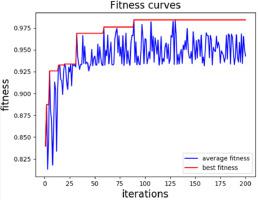当前位置:
X-MOL 学术
›
Comput. Electr. Eng.
›
论文详情
Our official English website, www.x-mol.net, welcomes your
feedback! (Note: you will need to create a separate account there.)
Predicting fan blade icing by using particle swarm optimization and support vector machine algorithm
Computers & Electrical Engineering ( IF 4.0 ) Pub Date : 2020-10-01 , DOI: 10.1016/j.compeleceng.2020.106751 Jiaohui Xu , Wen Tan , Tingshun Li
Computers & Electrical Engineering ( IF 4.0 ) Pub Date : 2020-10-01 , DOI: 10.1016/j.compeleceng.2020.106751 Jiaohui Xu , Wen Tan , Tingshun Li

|
Abstract Icing of wind turbine blades is a phenomenon that commonly occurs in autumn and winter and critically affects the safety and efficiency of wind turbine operation. Therefore, it is of considerable significance to predict whether wind turbine blades are frozen. The data used in this work are obtained from a supervisory control and data acquisition system. The particle swarm optimization algorithm is used to optimize the kernel function of the support vector machine to establish a model to predict whether a fan blade is frozen. Specifically, first, the data are preprocessed to eliminate apparent ice free data, and the data sets are further balanced using undersampling and oversampling techniques. Second, the appropriate eigenvalues are selected according to the icing mechanism. The optimal parameters of the support vector machine are obtained using particle swarm optimization algorithm. Finally, the characteristic value and parameters are substituted into the support vector machine to evaluate the fault mechanism of blade icing.
中文翻译:

使用粒子群优化和支持向量机算法预测风扇叶片结冰
摘要 风机叶片结冰是秋冬季常见的现象,严重影响风机运行的安全和效率。因此,预测风电叶片是否结冰具有相当重要的意义。这项工作中使用的数据是从监督控制和数据采集系统中获得的。采用粒子群优化算法对支持向量机的核函数进行优化,建立模型预测风扇叶片是否冻结。具体来说,首先对数据进行预处理以消除明显的无冰数据,然后使用欠采样和过采样技术进一步平衡数据集。其次,根据结冰机制选择合适的特征值。支持向量机的最优参数通过粒子群优化算法得到。最后,将特征值和参数代入支持向量机,对叶片结冰的故障机理进行评价。
更新日期:2020-10-01
中文翻译:

使用粒子群优化和支持向量机算法预测风扇叶片结冰
摘要 风机叶片结冰是秋冬季常见的现象,严重影响风机运行的安全和效率。因此,预测风电叶片是否结冰具有相当重要的意义。这项工作中使用的数据是从监督控制和数据采集系统中获得的。采用粒子群优化算法对支持向量机的核函数进行优化,建立模型预测风扇叶片是否冻结。具体来说,首先对数据进行预处理以消除明显的无冰数据,然后使用欠采样和过采样技术进一步平衡数据集。其次,根据结冰机制选择合适的特征值。支持向量机的最优参数通过粒子群优化算法得到。最后,将特征值和参数代入支持向量机,对叶片结冰的故障机理进行评价。











































 京公网安备 11010802027423号
京公网安备 11010802027423号